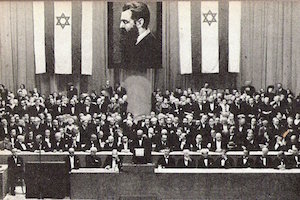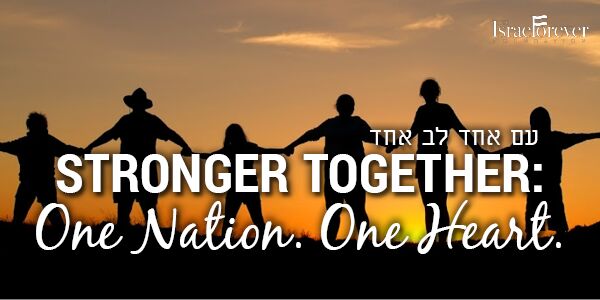The Zionism of WIZO
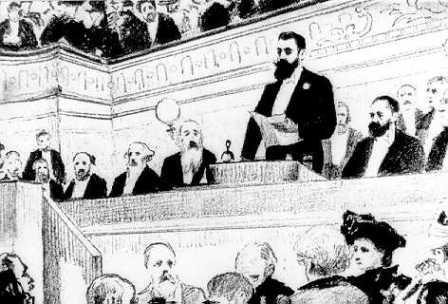
A painting of Herzl speaking at the First Zionist Congress in Basil, Switzerland in 1897
Participating for the very first time in the 37th Zionist Congress as part of the WIZO delegation, I am witness to Zionism in all its forms, in all its colours. Everyone of us, all of us Zionists, will define its finer points differently - sometimes even bizarrely but one thing unites us all - and that is that we all share the same passion for it, even if we do view it from a wide range of perspectives.
To attribute Zionism as merely being Herzl’s remedy to 19th century European anti-Semitism by giving the persecuted Jews a random territory (on the account of the ‘natives’) is not only an over-simplification of circumstances, it belittles the core issue, that of the 2,000 years of Jewish longing for their ancestral homeland.
Zionism addresses the need for the Jews to be able to live as one people on their own home turf.

But the very word ‘Zionism’ is judged by its ‘ism’ – a suffix denoting a system or principle, a condition, a practice. When we examine many of the other isms that come to mind, we see that the word Zionism suffers from unfair comparisons by the sheer weight of its suffix. Nazism, fascism, nationalism, have tainted the true meaning of the word and so Zionism, by virtue only of its ‘ism’ denotes a prejudice, a discrimination. The oft-quoted mantra, ‘Zionism equals racism,’ rolls off the tongue poetically, and somewhere along the line the connotation stuck. So it is the ‘ism’ at the end that gives Zionism a bad rap – and for that Israel suffers the slings and arrows of a world that refuses to get past the suffix.
Democracy, freedom of speech, equal opportunities, ‘tikkun olam’ (healing the world), and innovation for a greener, fresher, healthier world are all way past the stigma of the suffix. The strictly adhered-to code of conduct of the IDF is exemplary in its humanitarianism. The Israeli medics and emergency teams who treat and care for the injured and dying of hostile countries also contradict the stigma and yet coupled with an unhealthy dose of anti-Semitism and loathing for the State of Israel, Zionism still suffers from derision and contempt. The only ism to apply to these negative comparisons is absurdism. Apply the ism to humanism and you are on a winner.
Notwithstanding that the WIZO movement is unaffiliated politically; WIZO’s politics are unashamedly ZIONISM. Her very name, the acronym WIZO, puts the Z for Zionist proudly in its rightful place – at the centre of this commendable women’s international organization.
It is the indisputable focus towards which WIZO members around the world dedicate their efforts. WIZO is duty-bound by the principles on which she was founded to loudly and proudly, boldly and blatantly promote the wellbeing and interests of Israeli society, providing tools and opportunities to the citizens of Israel through her 800 projects. By volunteerism and support of WIZO, members and supporters are raising the Israeli flag in home countries across the globe, saying ‘I am a Zionist. I believe in the State of Israel as the homeland of the Jewish people. They are MY people and I care for them.’
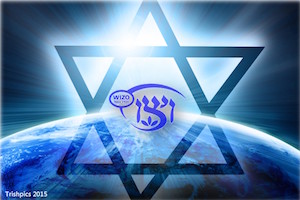
And by doing so, WIZO chaverot follow in the footsteps of WIZO’s founding mothers, Rebecca Sieff, Vera Weizmann and Romana Goodman, wives of prominent Zionist leaders, who, when faced with the ugly reality of the appalling living conditions in pre-State Palestine after World War I, quickly mobilized to save the Jewish population, which was ravaged by disease and famine.
In 1920, these founding mothers drew up a constitution for WIZO to address the urgent needs of Israeli society to provide solutions in home economics, legislation, health and social services with emphasis on agriculture, child care provision, guidance and nutrition. At the very same time, their husbands, prominent Zionists all, were working to underpin the foundations of what was to become the State of Israel. Today, 95 years later, WIZO continues to provide exceptional social services to a growing and diverse population.
To her many thousands of members, friends and supporters in the Diaspora, WIZO provides a pro-active, tangible link from the people of the Book to the people of Israel. This pinnacle of Jewish spirituality is paved with great historical significance and social conscience. That same social conscience, ‘to look after the brothers and sisters in Zion from the pioneers of yesteryear to those Jews escaping persecution even today, underpins the ethos of WIZO.
The Zionism of WIZO takes its ethos from the most purest and most basic act of love, that of the mother who nurtures her child. From woman to woman, mother to child and people to people, the Zionism of WIZO lies in the recognition that the children of Israel are her biggest asset.
Just like any Jewish mother, WIZO treats her children as equal and strives to strengthen the weakest and nurture the most needy.
Unlike many other Zionist organizations that believe that the ultimate goal of Zionism is to bring Jews from the Diaspora back to their ancestral homeland, WIZO’s Zionism is not set to uproot its brothers and sisters in the Diaspora. Quite the opposite, WIZO values and respects its Diaspora family and its right to live in peace and security. In doing so, and in order to continue to do so, it is, I believe, the obligation of every WIZO chavera, wherever in the world she lives, to dispel the misinformation associated with Zionism.
If you were to ask anyone what are the five major problems facing humanity in the 21st Century, by more or less universal consent they would be: climate change, global warming; the problem of the growing gap between first and third world economies; asylum seekers; terror, and creating democracies in parts of the world that have no tradition of it.
However, in the UK and Europe, for example, to oppose the growing trend of boycott, divestment and sanctions on Israel and to counter anti-Semitic and anti-Israel trend is no longer a mere option. It has become a necessity. As the stability and security of Jewish community life in the Diaspora becomes ever more threatened, then WIZO must look to strengthening its Diaspora sisters with effective advocacy, and in doing so, WIZO’s Zionism can bridge the gaps caused by ignorance and xenophobia.
WIZO’s Zionism equates humanitarianism. She does not discriminate, nor does she show prejudice towards creed or color. WIZO serves the people of Israel; all the people, providing care in equal parts, wherever the need arises. The well-being of the citizens of Israel is at WIZO’s heart. That is the Zionism of WIZO and a source of great pride to all who serve under her banner.
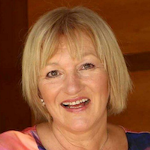
Tricia Schwitzer serves on both the World WIZO Executive and the Executive of Friends of WIZO. Prior to joining the executive, Tricia was the assistant editor of the WIZO Review. Special projects undertaken for World WIZO include Israel advocacy, social media marketing material and promotional writing. Read her blog HERE.
Recommended:
RISE ABOVE OUR DIFFERENCES AND UNITE FOR ISRAEL
Declare your commitment as a Virtual Citizen of Israel™ today!
About the Author


